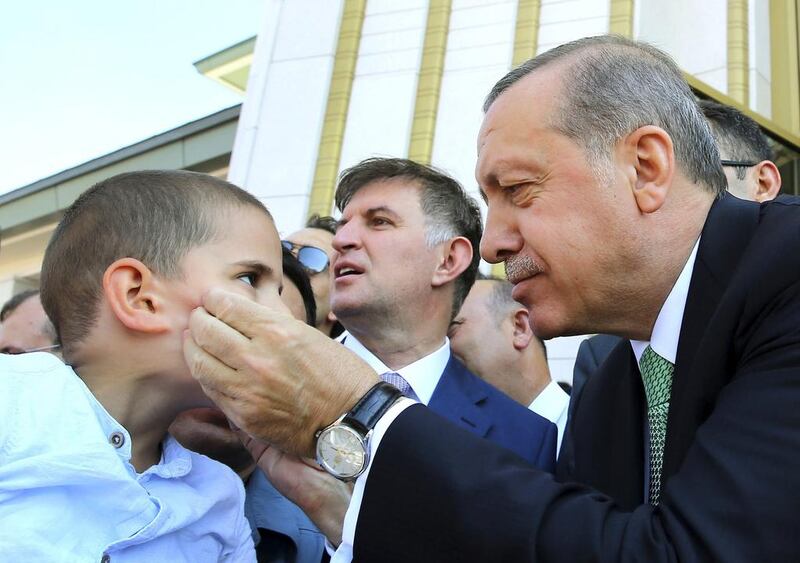Several events shook the region over the past three years and have had lasting consequences. From the takeover of Mosul in June 2014 to the Russian intervention in Syria last September, an extraordinary wave of tension succeeded each of those events and put the entire region on edge. Reactions to Turkey’s thwarted coup in the Arab world were particularly striking.
The show of support for Recep Tayyip Erdogan after the failure of the coup was often hysterical. The former leader of the Syrian National Coalition, Khaled Khoja, wrote on Twitter that recent cases of border guards shooting Syrians as they attempted to cross into Turkey should be blamed on one of the plotters, absolving the government of any responsibility, even though the government expressed no remorse for the killings.
Such remarks mean something. They underline the leverage Ankara can have over certain demographics in the region, namely Islamist-leaning populations and armed groups. The event mobilised sympathisers and polarised the neighbourhood, and this could reinforce Turkey’s leadership of Islamist movements.
Ankara’s foreign policy will probably be more assertive in the coming weeks and months. Domestically, the episode shows that the mark Mr Erdogan has already made in the Turkish political landscape might be deeper than it is often made out to be. Mr Erdogan leads a ruling party that is increasingly entrenched, not only because of power-grabbing but also because it commands an increasingly committed social and political base, and whose detractors sometimes appear to be detached from reality. Whereas Mr Erdogan’s popularity has been on display after each election, the media portrays him as an insecure and embattled leader. For Mr Erdogan and his supporters, the attempted coup and its failure justified the policies he followed over the past three years to increase his grip on power, which will embolden them to push further.
Large crowds took to the streets to reject the coup, and various sections of the Turkish opposition condemned the plot. The home front is becoming ever more conducive to a maximum consolidation of power. The campaign of arrests and purges that followed the neutralisation of the putschists was a chance Mr Erdogan could not miss. Similarly, Mr Erdogan will seek to capitalise on the unprecedented solidarity in Turkey’s southern neighbourhood. The Turkish role in the southern parts of Iraq and Syria was projected to increase even before the coup attempt, especially in Mosul and Aleppo.
In Mosul, Ankara’s relationship with the Kurdish Regional Government and Sunni politicians in northern Iraq will ensure Turkey has to be fully on-board in the upcoming battle to dislodge ISIL from the second largest Iraqi city. In Minbij, in the eastern countryside of Aleppo, Ankara worked closely with Washington to support the Kurdish and Arab forces currently battling ISIL. Both cases suggest Turkey is becoming more involved in the fight against ISIL, not because it is shifting focus, but because the expected shift to the ISIL fronts in northern Syria and Iraq makes Ankara an obvious partner.
Mr Erdogan’s domestic and foreign policies were largely interdependent. As an empowered president at home, Mr Erdogan’s regional ambitions will probably intensify. Indeed, he was on course to mend ties with his international adversaries before the uprising, including Israel, Russia, and Egypt.
Two days before the coup attempt, Turkish prime minister Binali Yildirim signalled his country was prepared to normalise relations with Damascus, a remarkable volte-face given the hostilities over the past five years. It is possible that the plotters thought such flirtation would strengthen Mr Erdogan’s rule, and thus hastened their plot. The surge in popular support for Mr Erdogan in the region should not be underestimated. Ankara’s support for Islamist groups throughout the Middle East and North Africa for the past half-decade, even at the cost of destabilising some countries, such as Syria and Libya, has purchased those groups’ support for Mr Erdogan.
The failure of the attempt belied, to a large degree, the narrative that Mr Erdogan was a president in decline, and this will encourage him to expand his influence and power projection in the neighbourhood to the south of Turkey.
Hassan Hassan is a resident fellow at the Tahrir Institute for Middle East Policy and co-author of ISIS: Inside the Army of Terror
On Twitter: @hxhassan





